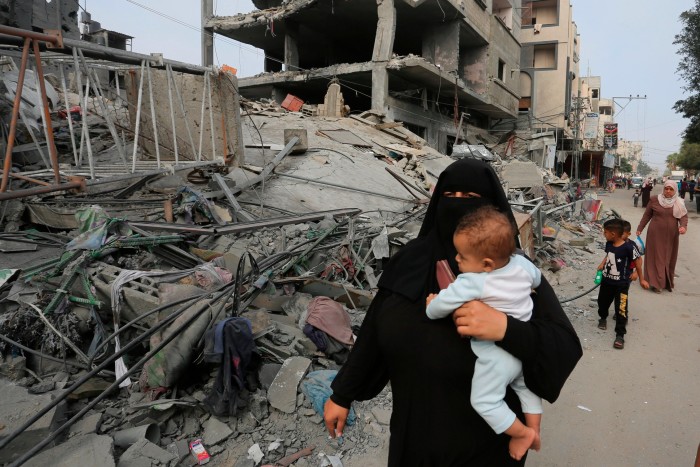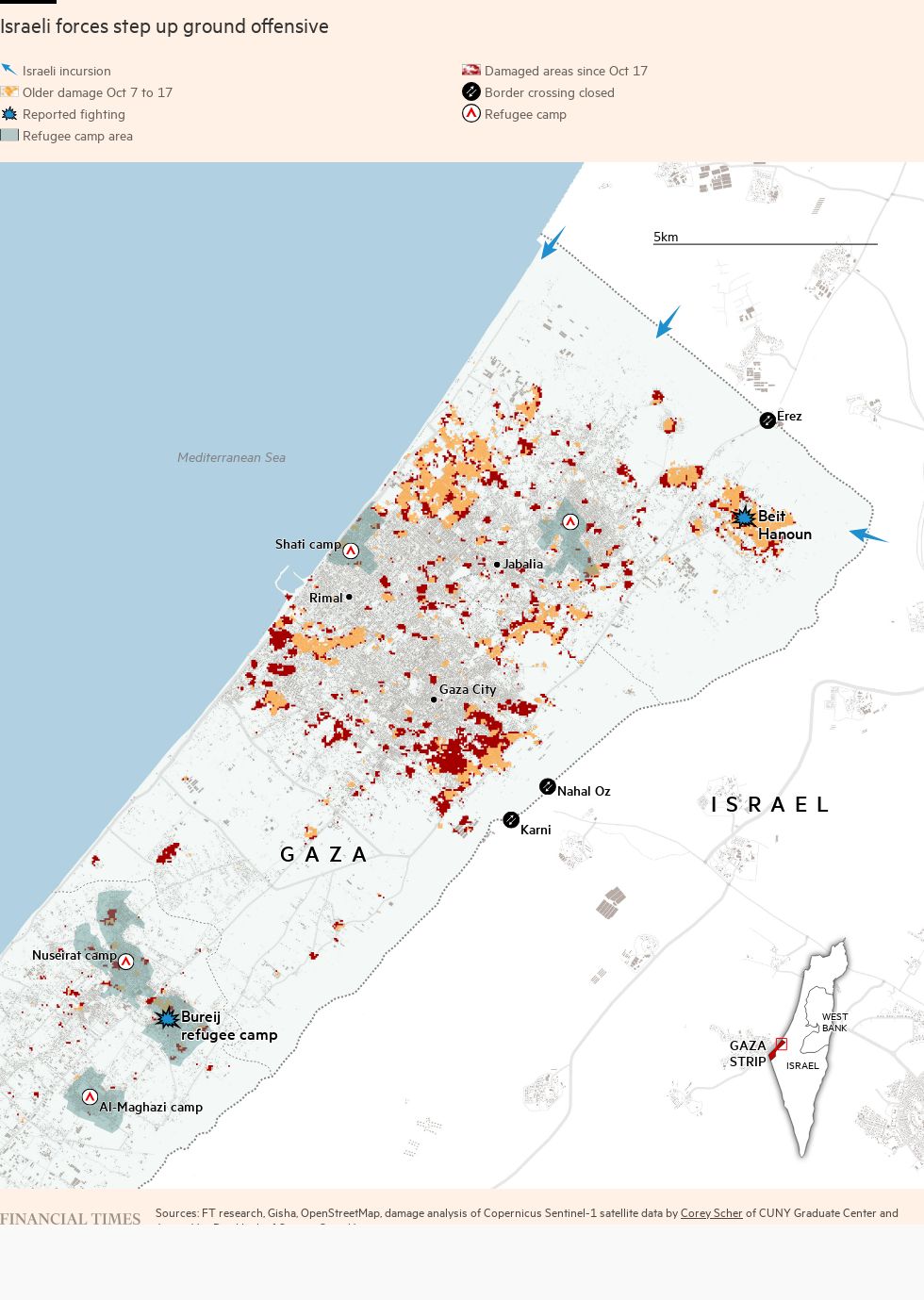Unlock the Editor’s Digest for free
Roula Khalaf, Editor of the FT, selects her favourite stories in this weekly newsletter.
Israel said its Gaza offensive was “advancing” after fighting through the night in a significantly expanded ground operation under the cover of an intense aerial bombardment that has knocked out most communications in the enclave.
The Israeli army’s fourth big incursion into Gaza this week appears to be its largest yet. On Saturday morning military spokesman Rear Admiral Daniel Hagari described it as “advancing in the phases of the war”.
In earlier raids, including one by naval commandos, Israeli troops withdrew within hours. This time, however, they appear to still be within the northern edges of the Gaza Strip the day after entering.
Hamas said it had engaged the Israeli military near Beit Hanoun, north of Gaza City.
The incursion was accompanied by the largest aerial bombardment since hostilities began three weeks ago. Israel also knocked out communications within the Gaza Strip, with cell phone, internet and landline connections lost late on Friday night.
“IDF forces entered the northern Gaza Strip and expanded the ground operations,” said Hagari. “Infantry, armoured, engineering and artillery forces that are accompanied by heavy fire are taking part in this operation.”
Video released by the IDF showed dozens of tanks operating within the perimeter fence which runs along the northern and eastern edges of the Gaza Strip, and alongside the Mediterranean Sea. Hagari did not say if they encountered heavy resistance, nor how deep into Gaza they had advanced.
One frame showed tanks near what appears to be the village of Beit Lahia, at the edge of the Jabalia refugee camp, which is usually densely populated. Israel has repeatedly ordered Palestinians to flee south, ahead of an anticipated ground operation that is likely to centre on Gaza City.
It is unclear how many civilians remain in the north.
The expanded offensive came days after Benjamin Netanyahu, Israel’s prime minister, said his government was preparing a “ground invasion” of Gaza. But it remained unclear on Saturday whether the intensification of military operations was the prelude to a wider war.
The IDF said it had hit 150 Hamas targets overnight, describing them as tunnels, combat spaces and underground infrastructure. It added that it had killed Asem Abu Rakaba, believed to be the head of Hamas’s aerial array that launched paragliders in the October 7 attack on Israel.
The communications blackout has made it difficult to update death tolls and for ambulances to rescue the wounded. The World Health Organization and Médecins Sans Frontières have lost contact with their teams.
As of last night, more than 7,300 people had been killed in Israeli air strikes, according to Palestinian officials. More than 1,400 people were killed in Israel by Hamas militants in the raid on October 7, according to the government, with 222 being held hostage.
Some images on social media showed large plumes of fire along the northern Gaza Strip and exchanges of fire. One person reached briefly by phone said the gunfire was continuing into the late morning.

Phillipe Lazzarini, the head of UNRWA, the UN agency that provides aid to Palestinian refugees, saying public services and civil order in the territory, home to 2.3mn people, were “collapsing”.
Israel has blocked humanitarian aid from entering Gaza, allowing only a few trucks each day that the UN and other agencies say are inadequate for the hundreds of thousands seeking refuge.
“Our aid operation is crumbling and for the first time ever, [UN staff] report that now people are hungry,” Lazzarini said.
Ishaq Sidr, Palestinian minister of telecommunications and information technology, told Palestine TV that Israeli warplanes had attacked telecoms infrastructure that included two points of contact with the outside world.
He said this was having a severe impact on ambulance services in the enclave and had stopped Gazans from transmitting and documenting Israeli attacks in real time. Human rights agencies echoed his concerns.
“This communications blackout means that it will be even more
difficult to obtain critical information and evidence about human
rights violations and war crimes being committed against Palestinian
civilians in Gaza, and to hear directly from those experiencing the
violations,” said Erika Guevara-Rosas, a senior researcher at
Amnesty International.

